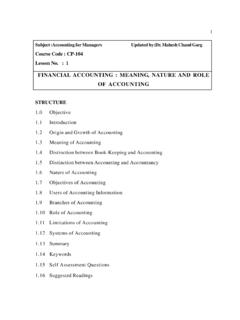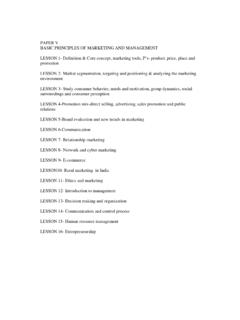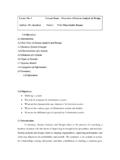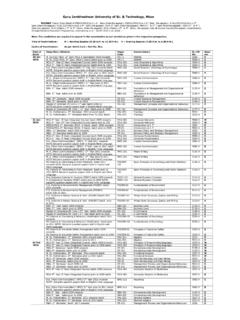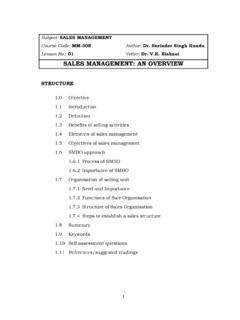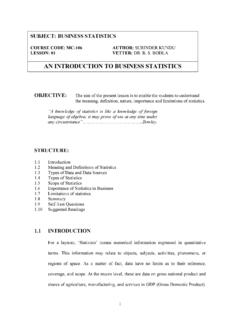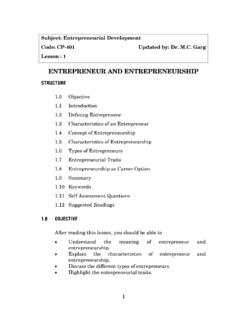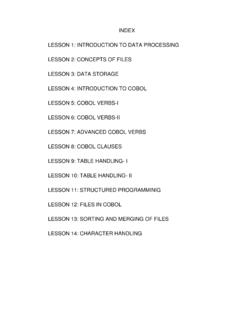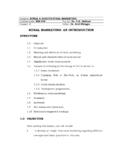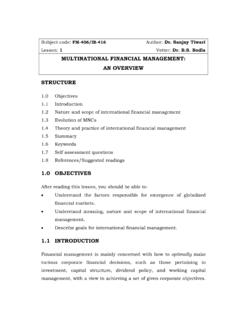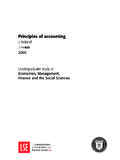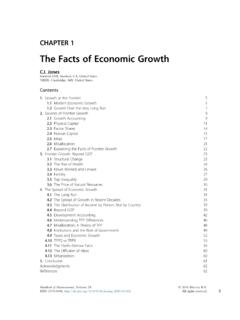Transcription of MANAGEMENT ACCOUNTING: NATURE AND SCOPE
1 1 MANAGEMENT accounting : NATURE AND SCOPE Objective: The present lesson explains the meaning, NATURE , SCOPE and limitations of accounting . Further, it discusses the activities covered under MANAGEMENT accounting and its difference with financial accounting . LESSON STRUCTURE Introduction Definitions of MANAGEMENT accounting NATURE of MANAGEMENT accounting Functions of MANAGEMENT accounting SCOPE of MANAGEMENT accounting The MANAGEMENT Accountant MANAGEMENT accounting and Financial accounting Cost accounting and MANAGEMENT accounting Limitations of MANAGEMENT accounting Self-Test Questions Suggested Readings INTRODUCTION MANAGEMENT accounting can be viewed as MANAGEMENT -oriented accounting . Basically it is the study of managerial aspect of financial accounting , " accounting in relation to MANAGEMENT function".
2 It shows how the accounting function can be re-oriented so as to fit it within the framework of MANAGEMENT activity. The primary task of MANAGEMENT accounting is, therefore, to redesign the entire accounting system so that it may serve the operational COURSE: MANAGEMENT accounting COURSE CODE: MC-105 AUTHOR: Dr. N. S. MALIK LESSON: 01 VETTER: Prof. M S Turan 2needs of the firm. If furnishes definite accounting information, past, present or future, which may be used as a basis for MANAGEMENT action. The financial data are so devised and systematically development that they become a unique tool for MANAGEMENT decision. DEFINITIONS OF MANAGEMENT accounting The term MANAGEMENT accounting , observe, Broad and Carmichael, covers all those services by which the accounting department can assist the top MANAGEMENT and other departments in the formation of policy, control of execution and appreciation of effectiveness.
3 This definition points out that MANAGEMENT is entrusted with the primary task of planning, execution and control of the operating activities of an enterprise. It constantly needs accounting information on which to base its decision. A decision based on data is usually correct and the risk of erring is minimized. The position of the MANAGEMENT in respect of its functions can be compared to that of an army general who wants to wage a successful battle. A general can hardly fight successfully unless he gets full information about the surrounding situation and the extent of effectiveness of each of his battalions and, to the extend possible, even the enemy's intentions. Like a general a successful MANAGEMENT too strives to outstrip other competitors in the field by streamlining its operating efficiency.
4 It needs a thorough knowledge of the situation and the circumstances in which the firm operates. Such knowledge can only be gained through the processed financial data rendered by the accounting department on the basis of which it can take policy decision regarding execution, control, etc. It is here that the role of MANAGEMENT accounting comes in. It supplies all sorts of accounting information in the 3form of such statements as may be needed by the MANAGEMENT . Therefore, MANAGEMENT accounting is concerned with the accumulation, classification and interpretation of information that assists individual executives to fulfill organizational objectives. The Report of the Anglo-American Council of Productivity (1950) has also given a definition of MANAGEMENT accounting , which has been widely accepted.
5 According to it, " MANAGEMENT accounting is the presentation of accounting information in such a way as to assist the MANAGEMENT in creation of policy and the day to day operation of an undertaking". The reasoning added to this statement was, "the technique of accounting is of extreme importance because it works in the most nearly universal medium available for the expression of facts, so that facts of great diversity can be represented in the same picture. It is not the production of these pictures that is a function of MANAGEMENT but the use of them." An analysis of the above definition shows that MANAGEMENT needs information for better decision-making and effectiveness. The collection and presentation of such information come within the area of MANAGEMENT accounting .
6 Thus, accounting information should be recorded and presented in the form of reports at such frequent intervals, as the MANAGEMENT may want. These reports present a systematic review of past events as well as an analytical survey of current economic trends. Such reports are mainly suggestive in approach and the data contained in them are quite up to date. The accounting data so supplied thus provide the informational basis of action. The quality of information so supplied depends upon its usefulness to MANAGEMENT in decision-making. The usual approach is that, first of all, a thorough analysis of the whole 4managerial process is made, then the information required for each area is explored, and finally, all the information, after analysis in terms of alternatives, is taken into consideration before arriving at a MANAGEMENT decision.
7 It is to be understood here that the accounting information has no end in itself; it is a means to an end. As its basic idea is to serve the MANAGEMENT , its form and frequency are all decided by managerial needs. Therefore, accounting aids the MANAGEMENT by providing quantitative information on the economic well being of the enterprise. It would be appropriate if we called MANAGEMENT accounting an Enterprise Economics. Its SCOPE extends to the use of certain modern sophisticated managerial techniques in analyzing and interpreting operative data and to the establishment of a communication network for financial reporting at all managerial levels of an organization. NATURE OF MANAGEMENT accounting The term MANAGEMENT accounting is composed of ' MANAGEMENT ' and ' accounting '.
8 The word ' MANAGEMENT ' here does not signify only the top MANAGEMENT but the entire personnel charged with the authority and responsibility of operating an enterprise. The task of MANAGEMENT accounting involves furnishing accounting information to the MANAGEMENT , which may base its decisions on it. It is through MANAGEMENT accounting that the MANAGEMENT gets the tools for an analysis of its administrative action and can lay suitable stress on the possible alternatives in terms of costs, prices and profits, etc. but it should be understood that the accounting information supplied to MANAGEMENT is not the sole basis for managerial decisions. Along with the accounting information, MANAGEMENT takes into consideration or weighs other factors concerning actual execution.
9 For reaching a final 5decision, MANAGEMENT has to apply its common sense, foresight, knowledge and experience of operating an enterprise, in addition to the information that is already has. The word ' accounting ' used in this phrase should not lead us to believe that it is restricted to a mere record of business transactions , book keeping only. It has indeed a 'macro-economic approach'. As it draws its raw material from several other disciplines like costing, statistics, mathematics, financial accounting , etc., it can be called an interdisciplinary subject, the SCOPE of which is not clearly demarcated. Other fields of study, which can be covered by MANAGEMENT accounting , are political science, sociology, psychology, MANAGEMENT , economics, statistics, law, etc. A knowledge of political science helps to understand authority relationship and responsibility identification in an organization.
10 A study of sociology helps to understand the behaviour of man in groups. Psychology enables us to know the mental make-up of employers and employees. A knowledge of these subjects helps to increase motivation, and to control the actions of the people who are ultimately responsible for costs. This builds a better employer-employee relationship and a sound morale. The subject of MANAGEMENT reveals the processes involved in the art of managing, a knowledge of economics assists in the determination of optimum output in the forecasting of sales and production, etc., and also makes it possible to analyze MANAGEMENT action in terms of cost revenues, profits, growth, etc. It is with the help of statistics that this information is presented to the MANAGEMENT in a form that can be assimilated.
